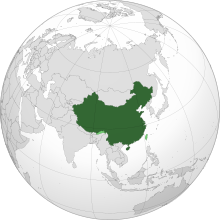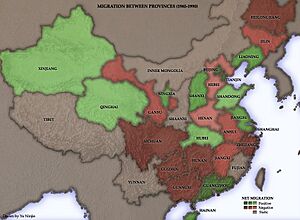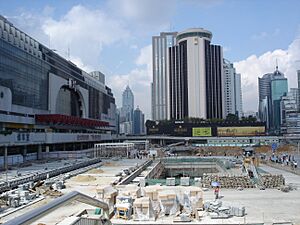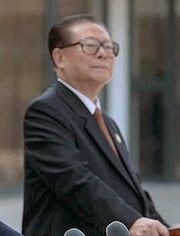History of the People's Republic of China (1989–2002) facts for kids
Quick facts for kids
People's Republic of China
|
|||||||||||||
|---|---|---|---|---|---|---|---|---|---|---|---|---|---|
| 1989–2002 | |||||||||||||
|
|
|||||||||||||
|
Anthem:
|
|||||||||||||

Land controlled by the People's Republic of China shown in dark green; land claimed but not controlled shown in light green.
|
|||||||||||||
| Capital | Beijing 39°55′N 116°23′E / 39.917°N 116.383°E |
||||||||||||
| Largest city | Shanghai (metropolitan area and urban area) | ||||||||||||
| Official languages | Standard Chinese | ||||||||||||
| Recognised regional languages | |||||||||||||
| Official script | Simplified Chinese | ||||||||||||
| Ethnic groups | See Ethnic groups in China | ||||||||||||
| Religion | See Religion in China | ||||||||||||
| Demonym(s) | Chinese | ||||||||||||
| Government | Unitary Marxist-Leninist one-party socialist republic | ||||||||||||
| Jiang Zemin | |||||||||||||
| Yang Shangkun (until 1993) Jiang Zemin (from 1993) |
|||||||||||||
|
• Premier
|
Li Peng (until 1998) Zhu Rongji (from 1998) |
||||||||||||
| Legislature | National People's Congress | ||||||||||||
| Historical era | Cold War, Post-Cold War | ||||||||||||
|
• Jiang Zemin became Paramount leader
|
24 June 1989 | ||||||||||||
| 26 December 1991 | |||||||||||||
| 1 July 1997 | |||||||||||||
|
• Retrocession of Macau
|
20 December 1999 | ||||||||||||
|
• Succession by Hu Jintao
|
15 November 2002 | ||||||||||||
| Area | |||||||||||||
|
• Total
|
9,596,961 km2 (3,705,407 sq mi) | ||||||||||||
|
• Water (%)
|
2.8% | ||||||||||||
| Population | |||||||||||||
|
• 2000
|
1,290,550,765 | ||||||||||||
| GDP (PPP) | 2002 estimate | ||||||||||||
|
• Total
|
|||||||||||||
|
• Per capita
|
|||||||||||||
| GDP (nominal) | 2002 estimate | ||||||||||||
|
• Total
|
|||||||||||||
|
• Per capita
|
|||||||||||||
| HDI (2002) | 0.604 medium · 113rd |
||||||||||||
| Currency | Renminbi (yuan; ¥) (CNY) | ||||||||||||
| Time zone | UTC+8 (China Standard Time) | ||||||||||||
| Date format | |||||||||||||
| Driving side | right | ||||||||||||
| Calling code | +86 | ||||||||||||
| ISO 3166 code | CN | ||||||||||||
| Internet TLD | |||||||||||||
|
|||||||||||||
After the events of 1989, Deng Xiaoping stepped down as China's top leader. He was replaced by Jiang Zemin, who had been a leader in Shanghai. The events of 1989 caused problems for China's image around the world. Other countries placed restrictions on China. However, the situation slowly became stable again.
Deng Xiaoping had tried to create a system where power was shared. But Jiang Zemin brought power back to himself. He took control of the Communist Party, the government, and the military. The 1990s were a time of strong economic growth for China. Yet, some problems remained. These included closing state-owned businesses, more corruption, and rising unemployment. Environmental issues also became a concern. During this time, people started buying more goods. New spiritual groups like Falun Gong also appeared. The 1990s also saw Hong Kong and Macau return to Chinese control. This happened under a special plan called "One Country, Two Systems". China also saw a rise in nationalism when facing problems with other countries.
Contents
China's Comeback in the 1990s
Bringing Back Economic Stability
By the early 1990s, the rising prices from before 1989 had calmed down. Jiang Zemin and the new leaders worked to stabilize the economy. The government became more stable. This was thanks to the rules set up by Deng Xiaoping. Also, a new generation of leaders took over. They were well-educated professionals, not just revolutionaries. Many university graduates studied science. Some chose to live outside China. Those who stayed often worked for state-owned research companies.
After the 1989 events, China faced international criticism. The next three years were tough. Strict leaders took over the government. They tried to limit free business. They also tried to bring back old ideas from Mao Zedong. But most people did not care much about these ideas. The changes of the past decade made it impossible to go back to Mao's time.
The Chinese Communist Party (CCP) leaders were also worried by the fall of communism in Eastern Europe. This happened in 1989–1990. They were especially surprised by the fall of Romania's leader, Nicolae Ceaușescu. China's government still said it welcomed foreign business. Even with its problems, the CCP had no strong opposition. Most groups against the government were divided.
In April 1990, Chinese Premier Li Peng visited Moscow. He faced many Soviet protesters. They called him a "butcher." Li showed his loyalty to communism. He believed in economic changes, but not political ones. He did not think that ideas like glasnost (openness) and perestroika (restructuring) applied to China.
The failure of a coup in Moscow in August 1991 also worried Chinese leaders. China said that events in Eastern Europe and the Soviet Union were their own business. China quickly recognized all the new countries that formed from the Soviet Union. But inside the CCP, leaders believed the Soviets made a big mistake. They thought Mikhail Gorbachev allowed capitalism to return. They also thought the coup failed because the Soviet army was not loyal to Marxism-Leninism. So, China increased political education for its army.
Meanwhile, relations with the United States became very bad after 1989. They were the worst since President Richard Nixon's visit in 1972. The US Congress wanted to stop economic ties with China. But President George H.W. Bush believed relations would improve. He had worked in China in the 1970s. However, he angered Beijing by meeting the exiled Dalai Lama in April 1991. China became more suspicious of the US. They accused Washington of trying to weaken their socialist system. The US Congress also accused China of using prison labor. They also said China sold weapons to countries in the Middle East. Military ties between China and the US ended in 1989. All sales of US military equipment to China were stopped.
During the Persian Gulf crisis in 1990–91, China criticized Iraq's invasion of Kuwait. But they also criticized the UN's involvement. China said it was a local problem that Arab countries should solve.
Deng Xiaoping's Southern Tour
In 1992, Deng Xiaoping made a public appearance. He traveled to southern China. This trip was to show his support for reforms. He wanted to stop the country from going back to Maoist ideas. On this trip, he criticized the CCP for being too "leftist." This visit was Deng's last major public appearance. It was also a test for the new leaders.
Deng's push for a market-based economy was approved later that year. This happened at the 14th National Congress of the Chinese Communist Party. Many younger, reform-minded leaders started to rise to top positions. The congress also confirmed Jiang Zemin as the new General Secretary of the Chinese Communist Party. He became the "core of CCP leadership." This made Jiang the leader of the "Third-generation."
Deng and his supporters argued that more reforms were needed. This would help improve China's living standards. After his visit, the Communist Party leaders publicly supported Deng's economic policies. China focused mainly on opening its economy. Relations with Western countries improved by 1993. Deng reminded the CCP that China did not have the resources to challenge the US. He said capitalism and democracy were strong. He believed China had to follow a quiet foreign policy.
Future leaders would face social problems due to economic changes. But politically, Deng's idea of separating power failed. During this time, Jiang Zemin took on three important roles. He became the CCP General Secretary, the President, and the Chairman of the Central Military Commission. This brought political stability and centralized power again.
Deng Xiaoping's Impact
Deng Xiaoping was one of the few leaders from a peasant background. He led China, like Mao Zedong. Deng's policies opened China's economy to foreign investment. He allowed market ideas within a socialist system. This was a bold and new approach. It allowed free business to grow under a single-party government.
After Deng's death, under Jiang's leadership, mainland China grew rapidly. Its GDP grew by about 8% each year. This made China one of the fastest-growing major economies.
The rising prices that happened before 1989 had stopped. Political systems became stable. This was due to the rules set up during Deng's time. A new generation of educated leaders took over. In the early 1990s, social problems seemed to ease. China quickly became a more modern and wealthy nation. One journalist, Jim Rohwer, said Deng's reforms improved human well-being greatly. Deng's changes helped hundreds of millions of people escape poverty.
However, the reforms also created new problems. These were mainly social and political. By the mid-1990s, many state-owned businesses were not making money. They needed to be closed to stop wasting money. As more people moved to cities, unemployment became a big issue. Cities like Shanghai and Guangzhou saw the rise of poor neighborhoods. Also, by the mid-1990s, the benefits of Deng's reforms in farming had slowed down. Farmers' incomes were not growing. Deng's successors had to find new ways to boost growth in rural areas. Otherwise, they risked major social unrest.
Finally, Deng's policy of focusing on economic growth, while keeping the Communist Party in power, raised questions. Many wondered if a one-party system could control a changing and wealthy Chinese society forever. There were also questions about how much foreign business was in China. People wondered how long the government could control private businesses.
Deng Xiaoping passed away on February 19, 1997. His successor, Jiang Zemin, praised him. He said Deng devoted his life to the Chinese people. Deng's ideas, called Deng Xiaoping Theory, became an official guide in the national Constitution.
Hong Kong and Macau Return to China
Hong Kong returned to Chinese control on July 1, 1997. It had been leased to Britain for 99 years. The agreement followed Deng's idea of "One Country, Two Systems". Hong Kong would keep its independence in most areas. Only foreign affairs and defense would be controlled by China. This arrangement was set to last for fifty years.
Macau returned to Chinese control on December 20, 1999. This was under a similar agreement with Portugal. Both former colonies kept their own legal systems. The return of these two places created a new political system. The legal issues, especially with Hong Kong's Basic Law, were often debated. People wondered how much control mainland China had over their political systems. There were also debates about the leader of Hong Kong, Tung Chee-hwa. People questioned the level of democracy in Hong Kong. Hong Kong also competed with Shanghai to be the main business center in the region.
New Leaders Take Charge
Deng Xiaoping's health got worse before he died in 1997. During this time, General Secretary Jiang Zemin and other leaders slowly took over daily government duties. This group of leaders was called the "third generation." They governed together, with Jiang as the main leader. At first, many thought Jiang would only be a temporary leader. But by 1998, Jiang had gained full, centralized power. He removed a rival leader, Qiao Shi. He firmly held the positions of CCP General Secretary, President, and Chairman of the Central Military Commission. This made him China's paramount leader.
With support from Jiang Zemin and Li Peng, the government took strong economic steps. China stopped low-tech projects that were duplicated. They focused on transport, energy, and farming. They also kept a tight control on money. They worked to strengthen farming, which was still key to the country's economy.
In September 1997, Jiang was re-elected CCP general secretary. This happened during the 15th National Congress of the Chinese Communist Party. In March 1998, Jiang was re-elected President. Premier Li Peng had to step down from his role. He was elected to lead the National People's Congress. Zhu Rongji became the new premier. He was nominated by President Jiang Zemin and approved by the National People's Congress on March 17, 1998. Zhu was seen as a stronger and more popular leader than Li Peng.
The Falun Gong Movement
Falun Gong is a spiritual practice. It was founded by Li Hongzhi in 1992. It has some beliefs similar to Buddhism and Taoism. The government allowed it to grow for a few years.
In 1999, some academics and party members criticized these practices. Falun Gong followers then started writing letters to local leaders. They wanted to stop what they saw as "unfair" media criticism. An article in a newspaper in Tianjin in April started a series of events. It criticized "teenagers practicing Qi Gong" and specifically Falun Gong. This led to over 10,000 Falun Gong followers silently protesting outside the Beijing Zhongnanhai compound. They wanted the release of detained followers. Premier Zhu Rongji met with some Falun Gong representatives. He agreed to some, but not all, of their requests.
On June 10, 1999, the government created the "6-10 Office." This group was set up to crack down on "unusual faiths," including Falun Gong. China's state media attacked Falun Gong. They called it an unhealthy part of society. On July 22, the government banned the Falun Dafa Research Society. They called it an illegal group. They said it spread false ideas, tricked people, and caused problems. State television extended its prime time news to three hours that day. Many TV networks called Falun Gong an "evil cult." On July 23, the People's Daily newspaper published a full-page article attacking the movement.
On July 22, 1999, Falun Gong's founder, Li Hongzhi, spoke out. He asked for support from international governments and groups. He said Falun Gong had no special structure or political goals. He claimed it had never been involved in anti-government activities.
Human rights groups have reported that thousands of Falun Gong followers have been harmed since 1999. They claim people have been tortured, beaten, and put in forced labor camps. Tens of thousands more have been imprisoned. Falun Gong followers, including those from Western countries, continue to ask for an end to the persecution. They want the practice to be legal again. Followers inside China continue to resist the government's campaigns against Falun Gong. But they still face harassment, arrests, and worse, according to Falun Gong sources.
Economic Growth Continues
Premier Zhu Rongji kept China's economy strong in the late 1990s. Mainland China's growth averaged 9.7% a year for two decades until 2000. China handled the Asian Financial Crisis well. This crisis badly affected other Asian economies. China's survival was partly due to the government's control over the economy. Even with the financial crisis and big floods in 1998, China's GDP grew by 7.9% in the first nine months of 2002. This was better than the government's 7% goal. The government helped the economy by increasing wages and other measures. This showed the strength of China's economic system during tough times.

While global foreign investment dropped by half in 2000, money flowing into mainland China rose by 10%. Foreign companies rushed to be part of China's growth. Foreign investment in China rose by 22.6% in 2002. Global trade grew by only one percent in 2002. But mainland China's trade jumped by 18% in the first nine months of 2002. Its exports grew faster than its imports.
Zhu Rongji tackled big economic problems that other leaders were afraid to touch. Uneven development was a major issue. Many state-owned businesses were still inefficient. The banking system had many bad loans. There were disagreements among party leaders about how fast to make changes. Zhu was known to have a difficult relationship with CCP leader Jiang Zemin.
China's leaders also struggled to modernize state-owned businesses. They wanted to privatize them without causing huge unemployment in cities. Many people who suffered during the Cultural Revolution lacked proper education. They found it hard to find stable jobs in the new private workforce. Millions lost their jobs as state firms closed. Zhu demanded financial support for unemployed workers. Mainland China needed 100 million new urban jobs in five years. This was to help laid-off workers and people moving from rural areas. So far, they were meeting this goal due to high economic growth. Under Zhu and his deputy Wen Jiabao, the government helped unemployment. They did this by putting tax money into the economy. They also kept consumer spending high.
Some critics said there were too many manufactured goods. This drove down prices and profits. It also increased bad debt in banks. But demand for Chinese goods, both at home and abroad, was high enough to ease these worries. Consumer spending was growing. This was partly due to longer worker holidays.
Zhu's close helper, Vice-Premier Wen Jiabao, oversaw stock market rules. He worked to develop poorer inland provinces. This was to stop people from moving away and reduce regional unhappiness. Zhu and Wen set tax limits for farmers. This protected them from high taxes by corrupt officials. Zhu was respected by ordinary Chinese people. Western leaders also respected him. They credited him with China's World Trade Organization (WTO) deal. This deal brought a lot of foreign money into the country. Zhu remained Premier until March 2003. Then, Wen Jiabao became his successor. Wen was known for being a careful and skilled manager.
International Challenges
The bad relations with the US in the 1990s were not just about the 1989 events. Other factors played a role, like the end of the Cold War. This made cooperation between China and the US less important. The US military actions around the world also worried Beijing. These included actions in the Persian Gulf, Haiti, and the Balkans.
In 1995–96, the issue of Taiwan's political status came up again. Beijing was worried by Taiwan becoming a democracy in 1987. After relations with the US worsened in the early 1990s, America sold more weapons to Taiwan. In 1993, General Secretary Jiang Zemin said China's main goal was to stop Taiwan from declaring independence.
During this time, China began to modernize its military. They moved away from old ideas of a "people's war" with a large, lightly armed army. The US had stopped selling arms to China in 1989. But China found a new supplier in post-Soviet Russia. Russia was in economic trouble in the 1990s. It was willing to sell weapons to almost anyone who would pay.
The CCP also tried to remove the army from direct political decisions. Since 1997, no army general has been on the top Politburo Standing Committee. In 1998, the army was told to stop its business activities. They were to focus only on defense. However, this rule was not fully followed. Many army officers continued their businesses secretly. Corruption and selling army positions for money continued to be a problem in the army.
Taiwan's presidential elections were in 1996. Beijing began to build up its military near the Taiwan Straits. The army held two big military exercises in July 1995 and March 1996. This was to scare Taiwan into not electing a pro-independence president. In response, US President Bill Clinton sent the US 7th Fleet to the region. This was a major show of force. China quickly pulled back.
China's aggressive actions towards Taiwan caused more distrust with the US and China's neighbors. Military ties between the US and Japan grew stronger. In 1997, Washington and Tokyo signed a new defense agreement.
In 1999, relations with the US got worse again. NATO forces were bombing in Yugoslavia during the Kosovo War. They accidentally bombed the Chinese embassy in Belgrade. Three Chinese journalists died. Beijing reacted strongly. Large anti-US protests happened in Beijing. These were the biggest public protests since the pro-democracy movement 10 years earlier. The US said the bombing was an accident. But China did not accept this. They strongly condemned the action and demanded a full apology. Then-Vice-president Hu Jintao called the action "barbaric." He said it was due to "American hegemony" (US dominance). He used traditional slogans to unite the Chinese people behind the government. As protests grew, the government tried to calm the wave of nationalism.
More problems with the US happened in 1999. China was accused of spying at the Los Alamos Nuclear Weapons Laboratory in New Mexico.
Around the year 2000, China had a healthy economy. It had more foreign investment. But it faced a more uncertain position globally. Human rights became a concern for many Western governments. Most Western leaders brought up this issue during official visits. In Taiwan, pro-Taiwan Independence groups won elections for the first time. This limited talks about Chinese unification. Li Teng-hui stated that Taiwan was a separate entity from China.
Another clash with the United States happened in April 2001. A US spy plane collided with a Chinese jet fighter over the South China Sea. The Chinese pilot died. The American EP-3E spy plane had to land on Hainan Island. Chinese authorities held the crew and took the aircraft. After two weeks of talks, the crew was released. Three months later, China returned the plane to the US in pieces.
Meanwhile, in July 2001, China and Russia signed a 20-year treaty. This was the Treaty of Friendship and Cooperation. It aimed to increase cooperation between China and Russia. This included economic, military, and diplomatic areas. It was seen as a step to balance US dominance in global affairs. China and Russia also agreed on their border.
See also
 | May Edward Chinn |
 | Rebecca Cole |
 | Alexa Canady |
 | Dorothy Lavinia Brown |





